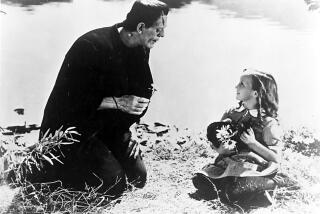Book Review : Female Biologist Splices DNA and SEX
- Share via
Recombinations by Perri Klass (Putnam’s: $17.95)
“Recombinations” makes tantalizing reading. Perri Klass takes us from her heroine’s bed into her laboratory and into her mind. The accounts of the biologist Anne’s sexual activities are often gratuitous but the setting and her reflections make “Recombinations” more than a description of the joys of sex.
Klass is an essayist, short-story writer and medical student. She uses the large loom of a novel to weave threads of what life in the laboratory is like for an ambitious biologist with threads of the heroine’s thoughts about what it is to be a scientist and at the same time a woman of a certain age.
The fabric doesn’t hold. Klass is good at describing science and good at analyzing the way people rationalize their roles in the world, but not yet good enough at making these people into sympathetic characters. Her heroine is so self-absorbed and arrogant that the reader becomes indifferent to her fate. We are instructed to think kindly of Anne because she was orphaned at a crucial stage of adolescence. But that doesn’t make us like her.
The novel is like the quilt that Anne drapes on her bed as she moves yet again, toward the end of her story. It has no pattern but is somehow attractive. Many of the patches in “Recombinations” are fascinating enough to warrant skimming over the rest of the uninspired squares.
The title is well chosen. In the laboratory Anne works with recombinant DNA, carefully cutting and splicing chains of the molecule to create new sequences. After hours, Anne disposes of old alliances and splices new ones, recombining the lives of couples as a metaphor of possible, often irrational arrangements.
Either Klass, or Anne, is ambivalent toward the world of the non-scientist. Anne reflects back to the morning in the lab when she experienced “one of those lightning moments of inspiration which are so important in the popular picture of how science works.” It is as if she grudgingly admits that sometimes the “popular picture” is right, that non-scientists can, in fact, understand what it is all about.
She is intriguing when she ponders the microscopic world Anne works in, contrasting it to the macroscopic world of human involvements. She is less convincing describing in “one-of-the-boys” language the sensuous nether regions of the male objects of her affections.
Klass does not so much dramatize her characters as have her heroine think about them. Too much of the narrative is reminiscent of dormitory rehashes of the last weekend’s activities. “Recombinations” reads as if Klass set out all the materials for a best seller, the way her Anne might set out her supplies for an experiment: a heroine with an unusual job, an orphan, and lots of sex. Good fiction, however, takes more than assembling a list of ingredients or stringing a chain of linked episodes.
More to Read
Sign up for our Book Club newsletter
Get the latest news, events and more from the Los Angeles Times Book Club, and help us get L.A. reading and talking.
You may occasionally receive promotional content from the Los Angeles Times.










